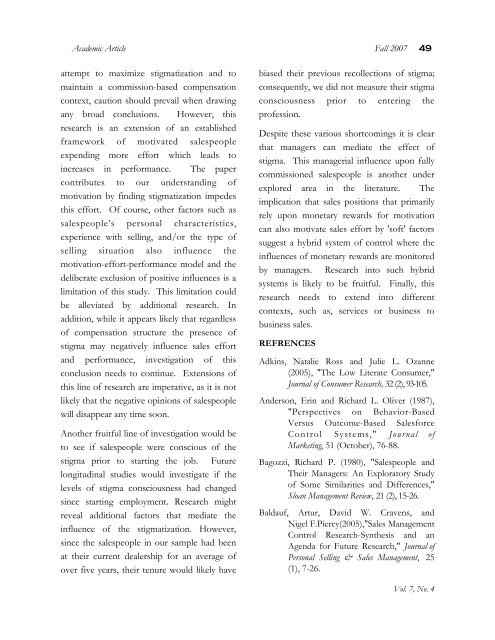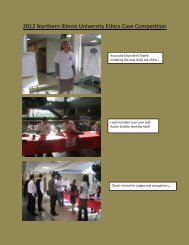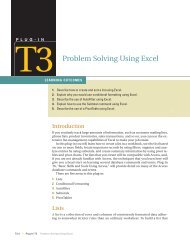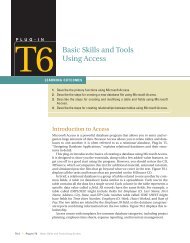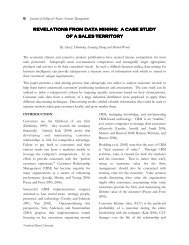The Impact of Stigma: Negative Stereotypes of Salespeople
The Impact of Stigma: Negative Stereotypes of Salespeople
The Impact of Stigma: Negative Stereotypes of Salespeople
Create successful ePaper yourself
Turn your PDF publications into a flip-book with our unique Google optimized e-Paper software.
Academic Article Fall 2007 49attempt to maximize stigmatization and tomaintain a commission-based compensationcontext, caution should prevail when drawingany broad conclusions. However, thisresearch is an extension <strong>of</strong> an establishedframework <strong>of</strong> motivated salespeopleexpending more effort which leads toincreases in performance. <strong>The</strong> papercontributes to our understanding <strong>of</strong>motivation by finding stigmatization impedesthis effort. Of course, other factors such assalespeople’s personal characteristics,experience with selling, and/or the type <strong>of</strong>selling situation also influence themotivation-effort-performance model and thedeliberate exclusion <strong>of</strong> positive influences is alimitation <strong>of</strong> this study. This limitation couldbe alleviated by additional research. Inaddition, while it appears likely that regardless<strong>of</strong> compensation structure the presence <strong>of</strong>stigma may negatively influence sales effortand performance, investigation <strong>of</strong> thisconclusion needs to continue. Extensions <strong>of</strong>this line <strong>of</strong> research are imperative, as it is notlikely that the negative opinions <strong>of</strong> salespeoplewill disappear any time soon.Another fruitful line <strong>of</strong> investigation would beto see if salespeople were conscious <strong>of</strong> thestigma prior to starting the job. Futurelongitudinal studies would investigate if thelevels <strong>of</strong> stigma consciousness had changedsince starting employment. Research mightreveal additional factors that mediate theinfluence <strong>of</strong> the stigmatization. However,since the salespeople in our sample had beenat their current dealership for an average <strong>of</strong>over five years, their tenure would likely havebiased their previous recollections <strong>of</strong> stigma;consequently, we did not measure their stigmaconsciousness prior to entering thepr<strong>of</strong>ession.Despite these various shortcomings it is clearthat managers can mediate the effect <strong>of</strong>stigma. This managerial influence upon fullycommissioned salespeople is another underexplored area in the literature. <strong>The</strong>implication that sales positions that primarilyrely upon monetary rewards for motivationcan also motivate sales effort by 's<strong>of</strong>t' factorssuggest a hybrid system <strong>of</strong> control where theinfluences <strong>of</strong> monetary rewards are monitoredby managers. Research into such hybridsystems is likely to be fruitful. Finally, thisresearch needs to extend into differentcontexts, such as, services or business tobusiness sales.REFRENCESAdkins, Natalie Ross and Julie L. Ozanne(2005), "<strong>The</strong> Low Literate Consumer,"Journal <strong>of</strong> Consumer Research, 32 (2), 93-105.Anderson, Erin and Richard L. Oliver (1987),"Perspectives on Behavior-BasedVersus Outcome-Based SalesforceControl Systems," Journal <strong>of</strong>Marketing, 51 (October), 76-88.Bagozzi, Richard P. (1980), "<strong>Salespeople</strong> and<strong>The</strong>ir Managers: An Exploratory Study<strong>of</strong> Some Similarities and Differences,"Sloan Management Review, 21 (2), 15-26.Baldauf, Artur, David W. Cravens, andNigel F.Piercy(2005),"Sales ManagementControl Research-Synthesis and anAgenda for Future Research," Journal <strong>of</strong>Personal Selling & Sales Management, 25(1), 7-26.Vol. 7, No. 4


